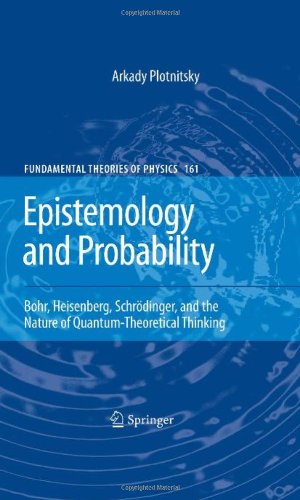

Most ebook files are in PDF format, so you can easily read them using various software such as Foxit Reader or directly on the Google Chrome browser.
Some ebook files are released by publishers in other formats such as .awz, .mobi, .epub, .fb2, etc. You may need to install specific software to read these formats on mobile/PC, such as Calibre.
Please read the tutorial at this link: https://ebookbell.com/faq
We offer FREE conversion to the popular formats you request; however, this may take some time. Therefore, right after payment, please email us, and we will try to provide the service as quickly as possible.
For some exceptional file formats or broken links (if any), please refrain from opening any disputes. Instead, email us first, and we will try to assist within a maximum of 6 hours.
EbookBell Team

5.0
68 reviewsThe book offers an exploration of the relationships between epistemology and probability in the work of Niels Bohr, Werner Heisenberg, and Erwin Schrödinger; in quantum mechanics; and in modern physics as a whole. It also considers the implications of these relationships and of quantum theory itself for our understanding of the nature of thinking and knowledge in general. These implications are radical and controversial. While they have been seen as scientifically productive and intellectually liberating to some, Bohr and Heisenberg among them, they have been troublesome to many others, beginning with Schrödinger and, most famously, Einstein, who refused to believe that God would resort to playing dice, as quantum theory appeared to demand. The situation led to an intense debate, in particular the great confrontation between Einstein and Bohr, which began around the time of the discovery of quantum mechanics by Heisenberg and Schrödinger in 1920s and has overshadowed the history of the debate concerning quantum mechanics ever since. The controversy itself surrounding quantum theory and the intensity of the debate concerning it have remained undiminished. No end appears to be in sight.
At the same time, in spite of the enormous and ever proliferating amount of commentaries in all genres (technical, philosophical, and popular), some of the deeper philosophical aspects of quantum mechanics and of the philosophical thought of the figures considered in this study often remain explored. The main aim of this book is to contribute to a better understanding of the nature of quantum-theoretical thinking and of the reasons for this extraordinary impact and controversy. Philosophically, the book pursues this task by bringing together in a new way the relationships between epistemology and probability in quantum theory and beyond. Historically, it does so by engaging comprehensively and in a mutually illuminating way with the work of all three key figures responsible for the birth of quantum mechanics - Heisenberg, Schrödinger, and, as concerns quantum epistemology, Bohr - which has not be previously done in literature on quantum mechanics. Among other key contributions of the book is an analysis of the role of mathematics in quantum theory and in the thinking of Bohr, Heisenberg, and Schrödinger; a new treatment of the famous experiment of Einstein, Podolsky, and Rosen (EPR) and of the Bohr-Einstein exchange concerning it; and an exploration of the implications of the epistemological problematics considered by the book for new developments of quantum mechanics itself, such as quantum information theory, on the one hand, and, on the other, for higher-level physical theories, from quantum field theory to string/brane theories and new cosmological theories.